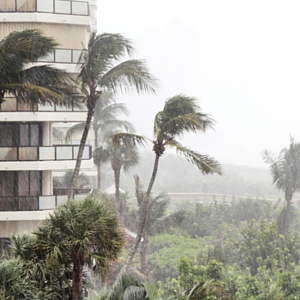Are You Ready for Hurricane Season?

When Hurricane Wilma hit South Florida in October 2005, it was a Category 2 storm that lingered over the area for several hours before it cleared out. The streets were white with sand, similar to a fresh snowfall on a street before anyone drives through it. Power lines were down, landscaping was destroyed, trees were uprooted and snapped, and entire cities were handicapped because they didn't have power for a week. Those who did not stock up on the appropriate supplies or fill their tanks with gas couldn't evacuate. All it takes is one week like that to make you realize the importance of preparing for a hurricane.
Usually hurricane warnings are issued days before the storm hits. Although the storm's path can be unpredictable, the severity of the storm can usually be predicted accurately. If you are advised to evacuate, factor the storm's category on the Saffir-Simpson Hurricane Wind Scale into your decision to stay or go. Here's what you should do before a hurricane, as well as what to expect during and after.
Preparing to Stay
Your decision to evacuate when a hurricane is headed your way depends on a lot of things—whether you have a place to go, whether you can afford a hotel for up to a week, and when you need to be back at work being among the most important factors. If you stay, consider the fact that there may be no power for up to a week—maybe more—and plan accordingly:
- Stock up on bottled water and as much ice as you can store without it melting.
- Buy non-perishable foods.
- Make sure you have what you need to fuel your grill.
- Get plenty of batteries for radios and flashlights.
- Have plenty of candles and matches on hand.
- Fill up the gas tanks in all of your vehicles and for gas-powered generators (if you have one).
- Make sure your cell phones are fully charged.
- If you don't have impact-resistant glass, put up hurricane shutters or cover windows with plywood. At a minimum, you can attempt to secure your windows with duct tape, but that might not be secure enough. Wind and rain could still break windows and cause damage.
- Bring in anything from outside that can blow away or cause destruction when the wind carries it away.
Tips for Evacuees
If you live somewhere that doesn't have hurricane shutters or impact-resistant glass, the best thing you can do is evacuate. Plan to leave well before the storm starts—you should never drive during a hurricane. Pack your car with anything valuable that can't be replaced like family photos, important documents such as your insurance cards and policy information, marriage licenses, birth certificates, etc. and anything sentimental. To minimize damage to items you have to leave behind, pack away pictures, wall hangings and other breakable items. You can store them in your bathtub if you have to, then cover the tub with blankets, pillows or other cushioning until the storm passes.
If you have more than one car and a driver for each, take the cars with you or park the ones you don't take in a public garage. Paying parking fees is much cheaper than paying to get damaged cars fixed. In most cases, your car insurance will cover the damage, but your deductible still applies.
Recovering from the Storm
Hurricanes can cause great devastation, and rebuilding or replacing items lost or damaged due to the storm can be costly. If you have the proper insurance coverage, recovering and rebuilding is much easier. That's why it's a good idea to meet with your insurance agent each year well before the start of hurricane season to review how much renters insurance you need to replace your personal items if you rent, and if you own your home, ask your agent to explain what your homeowners policy covers and if you need flood insurance. It's extremely important to have this review well in advance of hurricane season because most insurers will not allow new policies to be written or increases in coverage when a storm is already on its way.
Inevitably, you will make all of these preparations and the hurricane's projected path will change. That's fine—the worst that can happen is you will have to take down your shutters and unpack your breakables again. Don't live in the cone of uncertainty—if you don't prepare, you might regret it if the worst happens.
-
Don't Go Off-Road
 What to Do
What to DoWhen a hurricane hits, you shouldn’t be out driving, but if you ever find yourself driving in severe weather unexpectedly, here’s how to handle it.
-
Plan Ahead
 Get it Now
Get it NowFlood insurance has to be in effect for 10-30 days before a claim can be made, so it’s best to get it before storm season even starts.
-
Don't Be Left in the Dark
 Get Tips
Get TipsHurricanes can leave entire cities without power for days and sometimes weeks. Being armed with these tips for a power outage can help you survive it.
